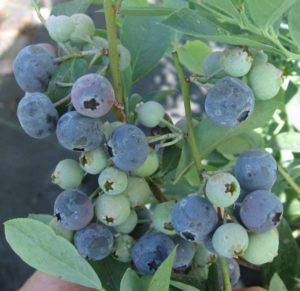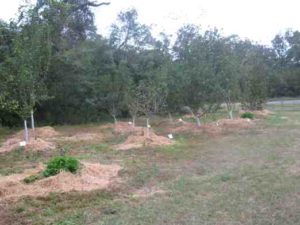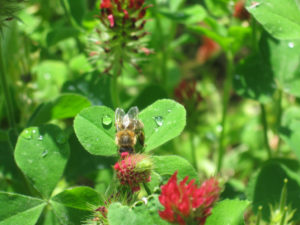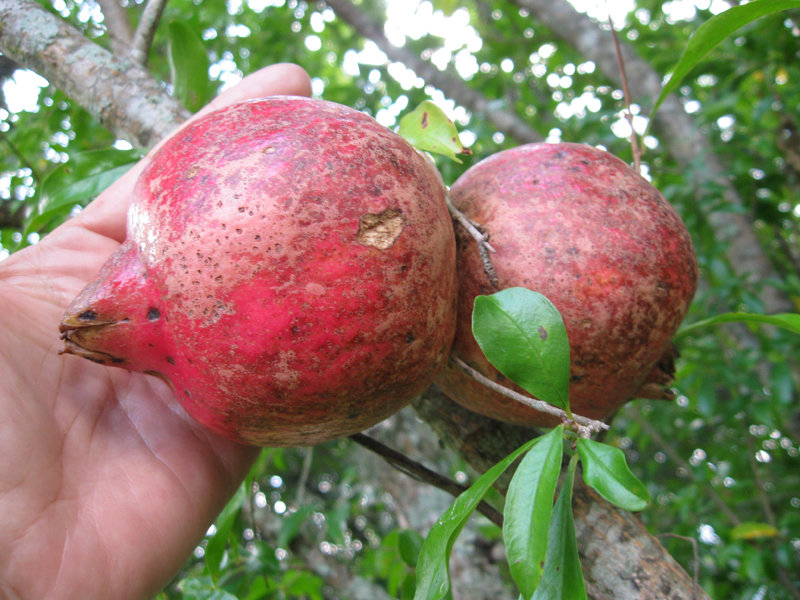[printfriendly]
Growing Fruit Organically

Growing your own fruit is one of the sweet pleasures in life. To be able to walk out your door and harvest a bowl of fresh blueberries for your cereal every summer morning is a feeling that comes close to heaven. Knowing that your fruit has been grown organically, is free of pesticide residues and fresh picked, not shipped from half way around the world, will make you feel better about the food you eat as well as the world you live in.
Developing an organic orchard is a long term proposition that involves learning from and working in harmony with the natural world around us. It is not a system of farming by neglect. In fact, in order to be successful, organic gardening requires careful consideration of what to plant and where to plant it, learning how to build the soil to feed your plants instead of relying on synthetic fertilizers, and nurturing beneficial insects to take care of pests.
To get the best possible start, choose fruit trees that are well suited to your area and that are known to be disease resistant. (See side bar for fruits that are easiest to grow organically.) It’s also is important to know what root stock your fruit tree is grafted on; many of our worst soil problems can be avoided by choosing trees on the right root stock.
As important as plant selection is site selection; most fruit require full sun to keep them healthy and productive, and well-drained soils to deter root rots and other soil diseases.

Begin by building up organic content of your soil. At our farm we lay down a one inch layer of manure or compost covered with a 4 inch layer of leaves or hay in a 10×10 foot area around each fruit tree in late winter. This combination will slowly decompose, feeding the tree while also blocking weed growth and creating a new layer of top soil. As we do this year by year, our soil is continually improving, helping to grow and feed our trees. We do some additional feedings of organic fertilizer in the summer to help promote growth on young trees and keep the trees healthy during the stressful fruit bearing cycle. It is also important to keep the plants well watered throughout their life and to pull all the fruit off the trees for the first year they are planted, to encourage the tree to develop a good structure and a strong start in life.
When it comes to dealing with bugs and fungus in the orchard, it’s important to have a sense of humor and some patience. Don’t reach for the bug spray right off, spend a little time learning why your plants are being attacked. Plants that are suffering from lack of food and water are like dinner bells to pests. Likewise, plants that are hyped up on too much nitrogen from liquid fertilizer feeds are also extra tasty to pests. Good orchard sanitation goes a long ways in stopping diseases; pick up wind falls and diseased fruits from under the tree. Sterilizing your pruning shears between trees, pruning out dead and diseased limbs and raking, burning, hauling off or composting fallen leaves and orchard prunings are all smart ways to avoid a build up of trouble in your orchard.

Maintaining wild areas around the orchard will also encourage beneficial bugs that prey on the bad bugs eating your fruit trees. For every bad bug running around in the garden there is a good bug close by waiting to catch and eat it. It’s important to give them a good place to live and breed. Growing wild flowers and plants that bloom throughout the year keeps beneficial insects fed and pollinators close at hand for when your fruit trees are flowering and need pollination. In addition to honeybees, which we are losing in alarming numbers, we should be working to encourage Mason Bees and Bumble Bees.
Growing your fruit organically offers many benefits. Your trees will live longer when grown in a soil that is full of rich organic matter and nutrients. Organically grown fruit is more nutritious and tastes so much better. The gardener who tends the plants is healthier from not spraying chemicals, and our earth benefits from avoiding the use of toxic materials.
To read more about good choices for fruit trees for our area visit our website at www.justfruitsandexotics.com/JFE.
To read more about growing fruit organically visit these websites: http://www.organicgardeningguru.com/ and http://attra.ncat.org/horticultural.html
Easy Fruits to Grow OrganicallyÂ
Walnut, Blackberry, Blueberry, Boysenberry, Chestnut, Citrus, Elderberry, Gingko, Goumi, Jujuba, Loquat, Mandarin Melon Berry, Mulberry, Muscadine Grape, Olive, Pawpaw, Pear, Pecan, Persimmon,Pineapple Guava and Pomegranate

From left to right: Arbequina Olive, Peggy’s Japanese Chestnut, Scarlet’s Soft Pear, Osage Blackberry
 
    Â
From Left to right: Southern Home Muscadine/Bunch Grape, Christmas Loquat, Just Fruits Goumi and GA 866 Jujube

